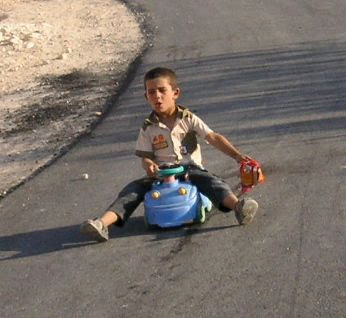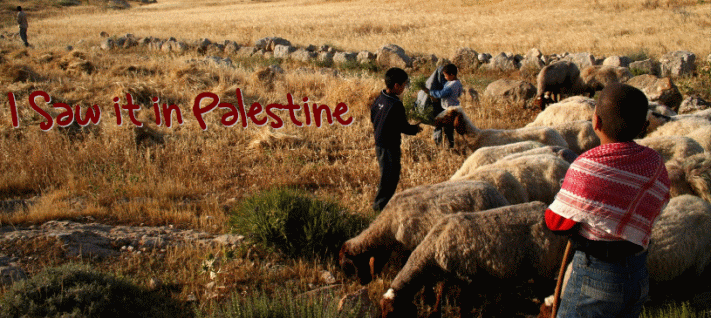Monday, August 24, 2009
It was the fireworks that undid me. All the woman held their ears and the children giggled. And Nasser sat across from me with his mouth wide open and eyes shining, laughing the laugh that I have missed for the last month. I dabbed at my eyes.
It was nearly midnight, but all of the children in Nasser's extended family ran races up and down the road outside of his house. First they ran, little Gomar falling down and crying. The kids picked her up and started their game again, this time jumping like rabbits. Then they leaped like frogs. Nasser's wife handed me tea and I as took it, I realized that the sparkle in her eyes was back. I had hardly known that it was gone because of the tremendous strength of this woman. But the change in all of Nasser's family was palpable. A hole the size of one man - father, husband, brother, and son - was filled. I noticed that Nasser's mother was wiping her eyes with the edge of her hijab and I all I could think was, "Praise God."
Sunday, August 23, 2009
"Nasser says hello," the woman said as she stood in my doorway and
smiled. I was barely able to choke out, "Say hello to him too."
Nasser, the woman's husband, is in prison. He was arrested on July
20th during a peaceful demonstration in At-Tuwani, the village where
he lives. He did nothing wrong, nothing but build a house on land he
owns. A Palestinian need do nothing more to be treated like a
criminal.
For the last month Nasser's family has been waiting for him to come
home. Nearly every week, an Israeli judge considered Nasser's case
and Nasser waited to be told when when he would be released from jail.
"There will be another hearing next Thursday," the judge said each
time. "Maybe then he can come home," I say to myself. But Nasser's
family is still waiting.
Last week, Nasser's family was told that he could come home if Nasser
paid a fine of 15,000 shekels, an impossibly large sum for someone
from a village that has been impoverished by the confiscation of their
land. The court never spoke with any of the Palestinians who witnessed
Nasser's arrest. My colleagues with Christian Peacemaker Teams video
tapped the entire incident, but our tapes were never entered into
evidence. The court just levied the fine and, frantically, the
village of At-Tuwani gathered the money together. Last Monday, they
tired to deliver it to the court, only to be told that the court would
only accept the money on Sunday. Come Sunday the court asked for
another 5,000 NIS. And Nasser's family continues to wait for him.
There are more than 11,000 Palestinians just like Nasser. They wait
in Israeli jails not knowing when they will see their families. This
is how Israel treats Palestinians going about their everyday lives -
building houses for their families, grazing their sheep, or going to
work. Meanwhile, the Israeli police refuse to prosecute Israeli
settlers for violent crimes. Time and time again, my colleagues and I
document settler violence against Palestinians and show our video
tapes to the Israeli police. Still, the police refuse to prosecute
settlers even when presented with overwhelming evidence. Conversely,
it takes only the word of a settler to land a Palestinian in jail.
Ramadan has now begun and Nasser's eldest son told me that Nasser is
fasting in prison. "But there isn't good food for him when he breaks
the fast," he explained. "Nasser really wants to come home." I
didn't know what to say, but the look on my face must have said it
all. "You're just like Adam," Nasser's wife said, laughing. Adam is
Nasser's youngest child. He is four years old. "He wants his father
too."
"It is possible" wrote renowned Palestinian poet Mahmoud Darwish, "for
prison walls to disappear."Yes, Adam and I both want Nasser to come home.
Even more than that, I want an end to the brutal occupation that
separates so many parents from their children.
Wednesday, August 19, 2009
Reason Number 9: Israel has Already Said Havot Ma'on Should Go
In 2006 the Israeli government issues demolish orders to all of the structures of the Havot Ma'on settlement outpost. Three years later, those structures are still standing and the settlement is expanding further every day.
Why hasn't Israel enforced it own directives against Havot Ma'on? Why are restrictions on Palestinian building enforced while Israeli settlers build as they please?
Stay tuned for the last of the top ten reasons!
Monday, August 17, 2009
Life here in At-Tuwani continues. It's hot enough that I can't help but eagerly await Ramadan's start when things will slow down again.
But despite the heat, At-Tuwani's nonviolent resistance carries on. Over the last month, shepherds have been grazing under ever increasing pressure from the Israeli army. For the first time since I began working in this area, it's become common for shepherds to be arrested for nothing more than grazing their sheep close to the settlement. I watch young shepherds, some still teenagers, weighing their need to find feed for their sheep and their desire to assert their claim to their land against the statements of Israeli police officers who threaten them with three months in jail. Meanwhile, we are still awaiting the release of our dear friend who was arrested for protesting Israel's unjust restrictions on Palestinian building.
Life under this Israeli government is harder for Palestinians than before, but the village of At-Tuwani isn't going any where.
The Prison Cell
By Mahmoud Darwish
I'm posting this poem because our dear friend and landlord is still in jail for his nonviolent resistance. It's been nearly a month now and the only thing that seems certain so far is that the court will be leaving huge fines - fine that will be tremendously difficult for his family to pay. This poem is for him.
It is possible...
It is possible at least sometimes...
It is possible especially now
To ride a horse
Inside a prison cell
And run away...
It is possible for prison walls
To disappear,
For the cell to become a distant land
Without frontiers:
What did you do with the walls?
I gave them back to the rocks.
And what did you do with the ceiling?
I turned it into a saddle.
And your chain?
I turned it into a pencil.
The prison guard got angry.
He put an end to the dialogue.
He said he didn't care for poetry,
And bolted the door of my cell.
He came back to see me
In the morning.
He shouted at me:
Where did all this water come from?
I brought it from the Nile.
And the trees?
From the orchards of Damascus.
And the music?
From my heartbeat.
The prison guard got mad.
He put an end to my dialogue.
He said he didn't like my poetry,
And bolted the door of my cell.
But he returned in the evening:
Where did this moon come from?
From the nights of Baghdad.
And the wine?
From the vineyards of Algiers.
And this freedom?
From the chain you tied me with last night.
The prison guard grew so sad...
He begged me to give him back
His freedom.
— Mahmoud Darwish (1941-2008)
Translated by Ben Bennani
Wednesday, August 12, 2009

At-Tuwani has a brand new paved road and it's the biggest toy to ever arrive in the village. My teammate Diane has great photos on her blog, Welcome to Tomorrow Morning!
Tuesday, August 04, 2009
Reason Number 8: For the sake of the Rule of Law and Israeli Democracy
The continued presence of Ma'on and Havot Ma'on is creating an environment of lawlessness is physically dangerous for Palestinians and sets a dangerous precedent of Israeli society. It's in the interest of both Palestinians and the Israeli state that the rule of law is fairly enforced.
When Palestinians are attacked by Israeli settlers, it's nearly impossible for them to get justice. Even when the Israeli police are presented with overwhelming evidence - eye witness testimony, photos, and video - they refuse to arrest and prosecute settlers. Last spring, settlers from the nearby settlement of Susiya were caught on video beating Palestinians. Even though the video was all over the news, the case was closed without prosecution.
When Palestinians build on privately held Palestinians land, they are issued demolition orders. When they protest this injustice nonviolently, they are arrested. Meanwhile, settlers build illegally on survey land, where all building is forbidden. They face no consequences whatsoever. (Photo: Continued construction on new building outside Havot Ma'on, 27 May 2009)
Placing particular citizens above the rule of law is bad for a democracy. It begs the question, at what point this two completely different systems of law called racism. At what point is it called apartheid? Israeli society can't afford to allow its citizens to use violence completely unchecked. And Palestinians can't afford to wait for safety and justice.
PS: According to OCHA, 80-90% of the files opened against Israeli settlers following attacks on Palestinians and their property are regularly closed by the Israeli police without prosecution.
Sunday, August 02, 2009
IBARW seems like an appropriate time to blog about a topic I've been meaning to address - hate speech in the context of the Israeli military occupation of Palestine.
I've heard and seen some pretty rough, racist stuff while I've been working in At-Tuwani. I remember clearly one afternoon when settlers came out of the settlement and into the village. They retreated quickly when the village came out to confront them nonviolently, but as soon as they were back in the settlement, they started making monkey noises, insinuated that Palestinians are subhuman. The incident turned my stomach.
But what frightens me more is the frequency of racist stereotypes combined with violent threats. We've caught settlers on camera telling Palestinians to "be careful" many occasions. when I began blogging about At-Tuwani, I received a series of threatening comments, not targeting me, but the people of At-Tuwani:
There's no such thing as "Palestine".
And as for the Christian part, all Christians know that God gave the land of Israel to the nation of israel- not to Ishmael.
It's written clearly in the Bible hundreds of times.
So is "thou shalt not steal".
The Ishmaelites need to stop being so greedy and violent and be happy with their own lands.
Tuwani will cease to exist if they continue to insist on violence and trying to ethnically cleanse the Jews from the land of Israel.
Peace for peace. War for war.
You chose war, and you will pay.
And you will pay much more than you try to make us pay
Here's the rub - the people of At-Tuwani have embraced nonviolent resistance, in the face of settler attempts to drive them out of their homes. I hope that it's obvious that these statements are little more that the repetition of stereotypes and hate - and the denial of one ethnic group's existence.
The people of At-Tuwani deserve safety, respect, and dare I say it, admiration for their brave nonviolence. They don't deserve stereotypes and threats.

